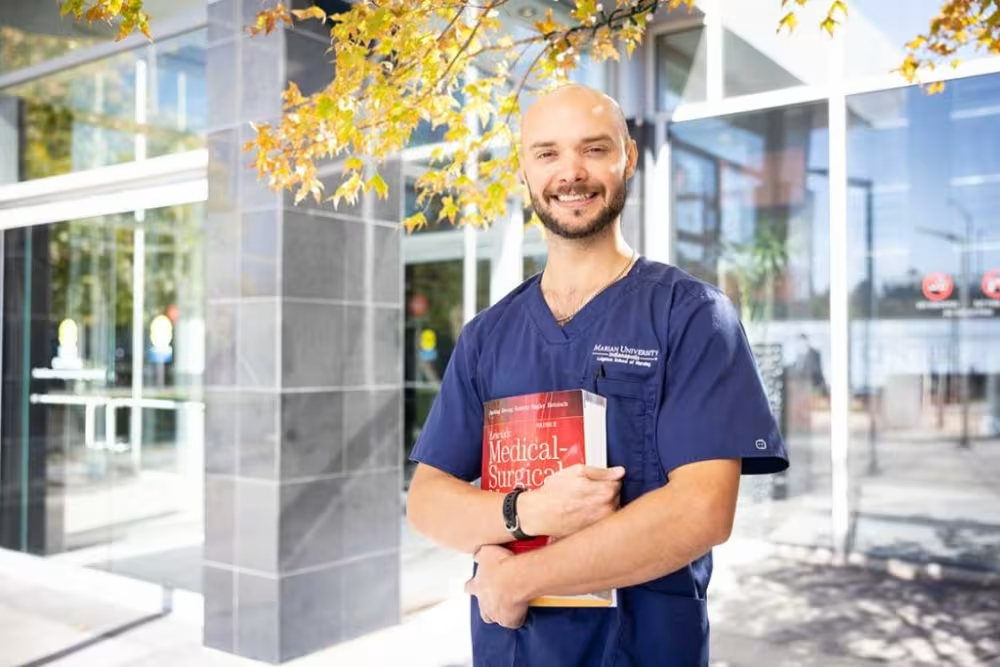How to Prepare For Nursing School In 9 Steps
Each blog post is dated and contains accurate information as of that date. Certain information may have changed since the blog post publication date. If you would like to confirm the current accuracy of blog information, please visit our ABSN overview page or contact admissions at 866.892.6463.
This guide reviews how to prepare for nursing school in 9 steps, covering prerequisites, application sessions, and continuous learning. Learn about what you can expect in Marian University’s ABSN program, and how your education will prepare you to excel in your nursing career.

Starting a new career path can be both exciting and overwhelming all at once, especially when the journey still seems somewhat uncertain. When preparing for a career such as nursing, there may be a sense of confusion about what your time as a nursing student might look like, and what types of programs you can enroll in. For that reason, it is essential for future nursing students to learn how to prepare for nursing school.
Marian University’s Accelerated Bachelor of Science in Nursing program is a 16-month pathway to earning a bachelor’s degree and preparing you for the NCLEX-RN exam and nurse licensure. We are committed to providing all prospective students with guidance on navigating nursing. With the right preparation, you can set yourself up to for success in nursing and to ensure you’re ready for the opportunities and challenges ahead of you. Here are nine simple steps to provide advice on how to prepare for nursing school.
1. Explore and Research The Field
When navigating nursing school preparation, you start by exploring the field of nursing and immersing yourself in diverse healthcare settings. This can be done by shadowing nurses across specialties to grasp patient care dynamics, and volunteering to gain hands-on experience in clinical environments. Researching nursing programs such as Marian University’s ABSN involves thoroughly examining the program’s curriculum and determining its alignment with your career goals, graduate outcomes, and job placements to guarantee comprehensive preparation for a successful nursing career.
Marian University stands out as an excellent choice for nursing education, it offers an ABSN program designed to equip students with practical skills and theoretical knowledge essential in the healthcare system. The university’s commitment to fostering a supportive learning environment and providing access to experienced faculty enhances the preparation process for aspiring nurses, ensuring they are well-prepared to excel in the dynamic and rewarding field of nursing.
Considering nursing? Take a look at Marian University’s ABSN Learning Center in Indianapolis.
2. Reach Out To An Advisor
Seeking advice from friends, previous instructors, and professionals in the field can provide valuable insights on how to prepare for nursing school. Once you are done, it is essential to reach out to an admissions advisor as well, who will guide you on your academic journey in nursing. The role admissions advisors play is very important to you as a nursing student, as they serve as essential points of contact throughout your academic career.
Marian University’s admissions advisors provide personalized guidance on program requirements, prerequisite courses, and application deadlines tailored to your goals. The advisors are ready to assist you every step of the way, offering insights into the school's culture, faculty expertise, and opportunities for hands-on experience. Establishing a relationship with Marian University’s admissions advisor early on ensures you make informed decisions and prepares you for success in this fulfilling career path.
3. Learn About Nursing Program Requirements
A critical step in preparing for nursing school is thoroughly understanding the program requirements. This involves researching and meeting prerequisites, such as completing specific courses in biology, chemistry, and anatomy. It’s essential to familiarize yourself with application deadlines, entrance exams, and any additional materials required by your chosen nursing school. This knowledge ensures you are well-prepared and meet all criteria for admission, setting a strong foundation for your nursing education.

Marian University’s ABSN program exemplifies a robust and comprehensive nursing education, offering a 16-month curriculum designed to equip students with the essential skills and knowledge needed for a successful nursing career. The program is renowned for its experienced faculty and supportive learning environment, making it an excellent choice for aspiring nurses.
4. Check Off All Prerequisites
Going over all nursing school prerequisites is a fundamental step in preparing for nursing school. In the field of nursing, this typically involves completing specific coursework in subjects such as biology, chemistry, anatomy, and physiology. It is crucial to verify that you have satisfied all academic requirements, maintained the necessary GPA, and gathered any additional documentation needed for your application. Properly checking off these prerequisites not only facilitates a smoother application process but also ensures you are academically prepared for the rigorous nursing curriculum ahead.
Marian University’s ABSN program exemplifies a comprehensive pathway to nursing education, specifically designed for individuals who already hold a non-nursing bachelor’s degree from an accredited institution. To qualify, applicants must meet GPA and credit requirements, in addition to completing all prerequisite courses. This program stands out for its strong academic framework and supportive faculty, making it an excellent choice for those transitioning into the nursing field.
5. Go To An In-person Application Session
Attending an in-person application session is a critical step in navigating the process, as you will receive one-on-one help on how to prepare for nursing school. This session, held at Marian University’s online-based ABSN program learning sites, allows you to meet with an admissions advisor who will guide you through the application process. These sessions are designed to help you understand the specific requirements, deadlines, and procedures necessary to complete your application successfully. The hands-on guidance provided, ensures that you are fully aware of all necessary tasks, forms, and paperwork, helping you avoid common pitfalls and ensuring a smooth application process.
Marian University’s ABSN program emphasizes the importance of these in-person application sessions to provide personalized support and clarify any questions you might have. These sessions are invaluable for getting a comprehensive overview of the nursing school environment and understanding what is expected of you as an applicant. Attending an in-person application session not only helps you stay on track with your application but also gives you a chance to visualize yourself in the nursing school setting, fostering confidence and readiness as you embark on your nursing education journey.

6. Attend Registration Day
Another crucial step in your journey is attending a Registration Day session. This event, typically held a few weeks before classes begin, is designed to ensure you are fully prepared for the start of your nursing education. During Registration Day, you will complete essential administrative tasks, such as registering for classes, and receive important information about the upcoming semester. This session also provides an opportunity to familiarize yourself with the campus, meet faculty members, and connect with your peers, fostering a supportive learning environment from the outset.
At Marian University, the ABSN program's Registration Days are vital for setting students up for success. These events offer a comprehensive overview of the program, allowing students to try on and order uniforms, purchase necessary supplies and textbooks, and learn about key dates and expectations. This thorough preparation ensures that students are well-equipped and confident as they embark on their accelerated nursing journey.
Why Choose Nursing? Discover the rewards and opportunities in nursing at Marian University. Learn more about Why Nursing might be perfect for you.
7. Establish Your Support System
Identifying and building a strong support system is essential when preparing for nursing school. In the demanding field of nursing, having a reliable network of family, friends, mentors, and peers can make a significant difference. This support system can provide emotional encouragement, practical advice, and academic assistance, helping you navigate the rigorous coursework and clinical experiences that come with nursing education. Establishing connections with fellow students and instructors can also foster collaborative learning and create a sense of community, both of which are vital for success in nursing school.

Marian University’s ABSN program emphasizes the importance of a robust support network. The program fosters a collaborative environment where students are encouraged to form study groups, share resources, and support each other throughout their educational journey. The faculty and staff at Marian University are dedicated to providing personalized guidance and mentorship, ensuring that students feel supported every step of the way. This nurturing atmosphere is one of the many reasons Marian University stands out as an excellent choice for aspiring nurses.
8. Purchase The Right Tools
Equipping yourself with the right tools is an essential step in preparing yourself for nursing school. In the nursing field, this means acquiring items such as medical-grade stethoscopes, scrubs, comfortable and supportive footwear, and essential textbooks. It's also important to invest in reliable technology, including a laptop or tablet, for accessing online resources, completing assignments, and participating in virtual classes. Properly outfitting yourself with these tools ensures that you are ready to handle the academic and practical demands of nursing school, ultimately enhancing your learning experience and performance.
Marian University’s ABSN program places a strong emphasis on ensuring students are fully prepared with all necessary tools. During the program's Registration Day, students receive guidance on purchasing uniforms, supplies, and textbooks, ensuring they have everything needed to succeed in the rigorous nursing curriculum. This comprehensive approach helps students start their journey with confidence and readiness.
9. Embrace Future Learning And Development
The final step is to embrace the mindset of continuous learning and professional development. Nursing is a dynamic field that constantly evolves with advancements in medical technology, treatments, and patient care practices. Staying informed about the latest developments, pursuing additional certifications, and engaging in ongoing education are essential for maintaining your competence and enhancing your career prospects.

Marian University’s ABSN program emphasizes the importance of lifelong learning, encouraging students to seek out opportunities for professional growth even after graduation. By fostering a commitment to continuous education, Marian University prepares its nursing graduates to excel in an ever-changing healthcare landscape, ensuring they remain at the forefront of the nursing profession. Contact us today to begin a conversation about whether Marian ABSN is the right choice for you.
